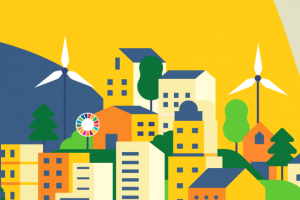Cities and urban areas have been at the epicentre of the COVID-19 pandemic which has drastically impacted the urban economy, including public services, employment and infrastructure, affecting all, but foremost the most vulnerable groups of the population. To support cities in their recovery from the COVID-19 pandemic and building resilience, in 2020-2022, the United Nations Regional Economic Commissions, UN-Habitat and the United Nations Capital Development Fund (UNDCF) have implemented the Building Urban Economic Resilience during and after COVID-19 project, which was supported by United Nations Development Account residual funds. The project assisted local governments in sixteen cities globally to analyze the impact of the pandemic on cities’ economies and assist them in developing economic recovery and resilience plans, including identifying possible funding sources for economic development and infrastructure projects supporting the urban economic recovery.
On 13 September, the Economic Commissions for Europe and for Asia and the Pacific, in cooperation with the other Regional Economic Commissions, as well as UN-Habitat's City Resilience Global Programme and UNCDF, hosted a side event to the United Nations Global South-South Development Expo 2022 “Promoting urban economic resilience in cities globally during and after COVID-19 through building knowledge base and interregional cooperation”. The side event focused on the experience of the implementation of the above global project and lessons learned; approaches of the pilot cities to promote urban economic resilience; and the tools developed within the project — the diagnostic analysis and the online training programme.
UNECE Deputy Executive Secretary Dmitry Mariyasin highlighted the importance of systems approach, building resilient city governments and leveraging investment for cities to be ready in the face of multiple crises.
The side event also launched the e-learning training course on urban economic resilience developed within the project. The e-learning course, Introduction to Urban Economic Resilience Diagnostics and Action Planning in the context of COVID-19, integrates knowledge derived from this two-year rapid response global project and presents this to a wider audience. Drawing from the real experiences of the 16 cities from across the globe, this free course is designed to serve as introductory training for local government officials and urban practitioners to enhance their knowledge in building urban economic resilience.
The course is divided into three modules and structured to facilitate a self-paced learning process. Participants will have the opportunity to gain an in-depth understanding of the topic through interactive elements and then to test the progress of their learning through quizzes.
Course participants will explore the general concepts of urban resilience and the conceptual framework for building economic resilience of cities. They will learn about the tool developed within the project — the Urban Economic Resilience Diagnostic and Planning Tool (DPT) — and its implementation in cities from different regions. With this, they will gain valuable knowledge to support their own cities in designing Economic Resilience Building Plans to be able to better withstand shocks, such as the COVID-19 pandemic, in the future.
Pilot countries/cities included: Albania (Tirana); Cameroon (Yaounde); Dominican Republic (Santo Domingo); Ecuador (Guayaquil); Egypt (Alexandria); Fiji (Suva); Ghana (Accra); India (Pune); Kuwait (Kuwait City); Kyrgyzstan (Bishkek); Lebanon (Beirut); Malaysia (Subang Jaya); Peru (Lima); Ukraine (Kharkiv); Viet Nam (Hoi An); and Zimbabwe (Harare).
Information on the UNDA project “Building Urban Economic Resilience during and after COVID-19” is available at https://urbaneconomicresilience.org


